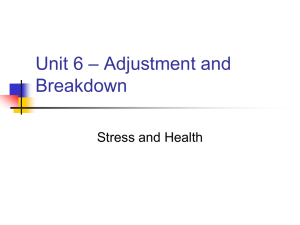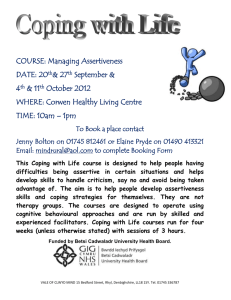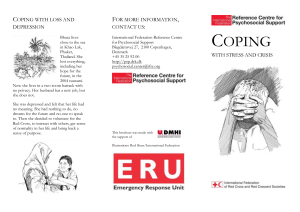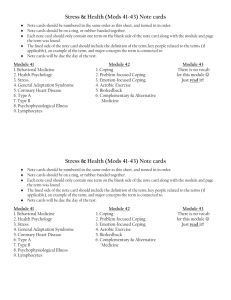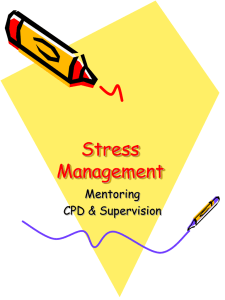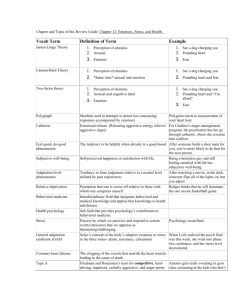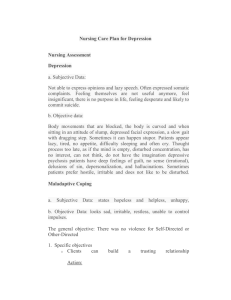Stress and Coping
advertisement
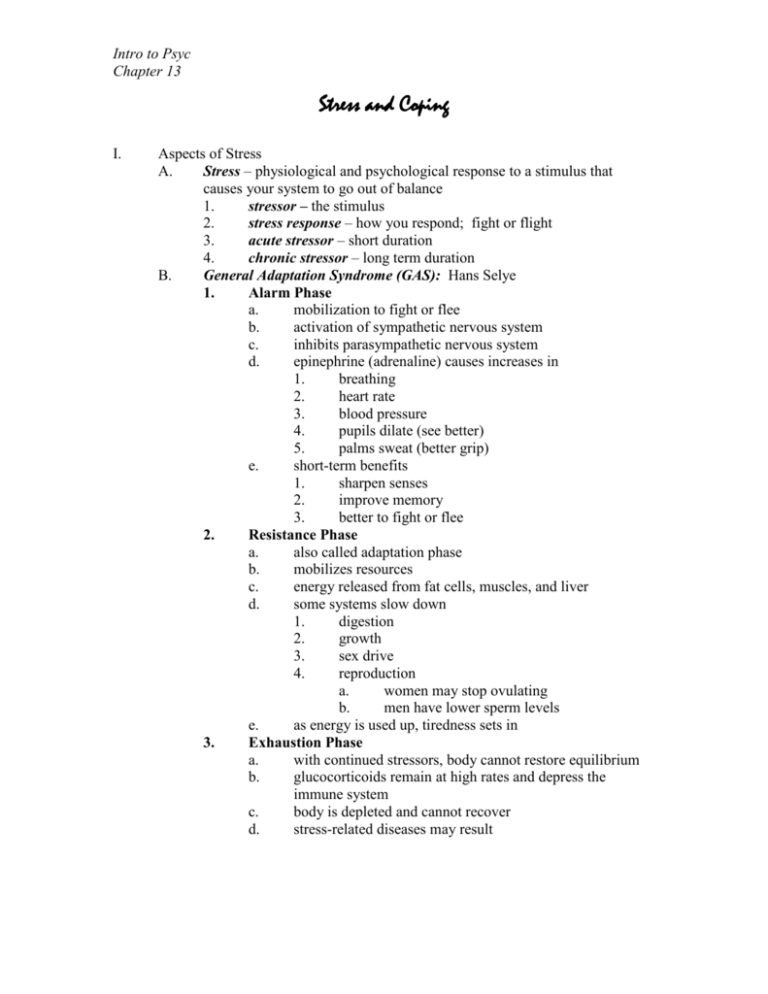
Intro to Psyc Chapter 13 Stress and Coping I. Aspects of Stress A. Stress – physiological and psychological response to a stimulus that causes your system to go out of balance 1. stressor – the stimulus 2. stress response – how you respond; fight or flight 3. acute stressor – short duration 4. chronic stressor – long term duration B. General Adaptation Syndrome (GAS): Hans Selye 1. Alarm Phase a. mobilization to fight or flee b. activation of sympathetic nervous system c. inhibits parasympathetic nervous system d. epinephrine (adrenaline) causes increases in 1. breathing 2. heart rate 3. blood pressure 4. pupils dilate (see better) 5. palms sweat (better grip) e. short-term benefits 1. sharpen senses 2. improve memory 3. better to fight or flee 2. Resistance Phase a. also called adaptation phase b. mobilizes resources c. energy released from fat cells, muscles, and liver d. some systems slow down 1. digestion 2. growth 3. sex drive 4. reproduction a. women may stop ovulating b. men have lower sperm levels e. as energy is used up, tiredness sets in 3. Exhaustion Phase a. with continued stressors, body cannot restore equilibrium b. glucocorticoids remain at high rates and depress the immune system c. body is depleted and cannot recover d. stress-related diseases may result Intro to Psyc Chapter 13 C. Sources of Stress 1. perception of stress; not all things stress all people all the time 2. stress determination a. primary appraisal – am I in danger? b. secondary appraisal – what can I do about it? c. coping follows secondary appraisal – a course of action 3. perceived control a. actual control not important; it’s the amount you think you have b. this can affect performance c. some people don’t want control d. cultural factors 1. our culture wants active control of self and environment 2. other cultures prefer adaptation e. predictable stress examples: 1. self-regulated medication 2. being bombed every day f. unpredictable stress 1. may lead to learned helplessness 2. vague information 3. not knowing when something will occur (bombing) 4. low SES 4. internal conflict a. conflict – emotional response to choices b. approach-approach conflict – 2 choices; equally positive c. avoidance-avoidance conflict – 2 choice; equally negative d. approach-avoidance conflict – a choice has positive and negative features; is both approach and avoidance 5. hassles a. more predictive of distress and stress-related illnesses b. when under a lot of stress, usually nonstressful things can become stressful c. example: interruptions 6. work-related factors a. density – number of people in a space b. crowding – subjective feeling of density; i.e. choosing a crowed event (football game; concert); living in a city c. burnout – chronic stress on the job resulting in mental exhaustion and feelings of low accomplishment 1. symptoms: a. tired b. depressed c. feeling trapped in the job Intro to Psyc Chapter 13 3. 7. II. high risk situations a. ambiguous work role b. work overload; too much to get done c. no social support d. feeling unappreciated e. unfair, rigid rules f. inconsiderate supervisor g. social services jobs working with people h. take work too seriously 4. solutions a. change jobs b. new career c. social supports d. outside activities d. conflicts on the job 1. interdependence – others must do their job so you can do yours 2. limited resources – not enough to go around 3. personal conflicts – people don’t get along hostility – mistrust, expecting others to harm or provoke; cynical attitude a. Type A personality – stressed, heart disease-prone characteristics b. men more hostile than women c. venting your anger keeps you angry and more aggressive toward others d. perceive stress in situation others do not Stress, Disease, and Health A. Cancer 1. stress doesn’t cause cancer, 2. can affect growth of tumors by suppressing immune system 3. promotes growth of blood vessels that feed the tumor 4. a sense of control may affect spread or recurrence B. Heart disease 1. stress may increase blood pressure 2. artherosclerosis – build up of plaque in the arteries 3. heart works harder to pump blood which further damages arteries 4. lifestyle changes help a. diet b. exercise c. stress management d. social support 5. depression can make condition worse Intro to Psyc Chapter 13 C. III. Behaviors 1. attempt to cope with stress 2. overeating, smoking or drinking 3. people underestimate the risks of these behaviors 4. 5 Stages Model of Change a. precontemplation 1. deny problem 2. temporarily change 3. relapse b. contemplation 1. think about change 2. will do something later, not now c. preparation 1. plan of action 2. mixed emotions about the change 3. procrastinate d. action 1. behavioral change 2. support from others e. maintenance 1. relapse prevention 2. support important Strategies for Coping A. Tactics 1. Focused coping a. problem-focused coping – changing the environment or your interaction with it 1. used by people who think their actions can affect the stress 2. internal types b. emotion-focused coping – changing your emotional response to the stressor 1. decreases arousal felt 2. used by people who don’t think their actions can affect the stressor 3. venting – type of emotion-focused coping; focusing on and talking about the stressor a. doesn’t work for anger b. can help traumatic experiences, but takes time Intro to Psyc Chapter 13 2. 3. 4. 5. thought suppression a. rebound effect – things pop into consciousness unexpectedly b. can negatively affect sympathetic nervous system c. using writing to express feelings can help immune system short-term vs long-term a. avoidant strategies work well short-term b. long-term strategies that deal with the stressor work better in the long term 1. positive reinterpretation – putting events into a positive light; look on the bright side 2. displace emotions onto something less threatening c. in the long run, however, it isn’t good to lie to yourself humor a. vents emotions b. mentally rest from stress c. uses positive reinterpretation d. a sense of humor gives you a different perspective on events aggression – behavior directed at harming another a. external factors 1. noise 2. heat 3. depression 4. pain b. hostile attribution bias – misread other’s intentions negatively (out to get me) c. frustration d. males more physically aggressive than females e. relational aggression – damaging relationship or using a relationship to hurt someone; females more aggressive with this type f. hostile people g. narcissists – people whose feelings of high self-esteem are not grounded in reality 1. do not deal well with criticism 2. seek ways to punish an evaluator 3. fuels the unrealistic self-esteem by being dominant over the evaluator 4. maintains self this way 5. explains some cases of workplace violence 6. nationalism is narcissism on a grand scale used to fuel prejudice, oppression, genocide h. sensation seekers i. aggressive people seem to have more trouble controlling their behaviors Intro to Psyc Chapter 13 B. C. D. E. Personality and coping 1. healthy personality a. hardy personality – traits associated with mental health; traits: commitment, control, and challenge b. less likely to be depressed 2. optimism and pessimism a. optimism 1. buffer against stress 2. positive expectancies 3. stable over time b. pessimism 1. associated with anxiety, stress, depression and poor health 2. 2 types a. true pessimism – neg. expectations stem from past failures b. defensive pessimism – expect a neg. outcome not supported by the facts 1. may protect against failure 2. adaptive 3. avoiding a. avoiders – also called repressors 1. use avoidant strategies (thought suppression) 2. avoid anything emotionally upsetting 3. may have neg. health effects b. nonavoiders – also called sensitizers Coping and social support 1. buffers against stress 2. also depression 3. related to better immune system function 4. secure attachment – lowest stress levels, use coping based in social supports Mind-body interventions 1. deal with changed in awareness and consciousness 2. examples: relaxation techniques, meditation, and hypnosis 3. exercise good for depression and pain 4. placebos – thinking you are getting a remedy may help (vitamins) Gender and Culture 1. women in Western cultures (USA) experience more stress a. multiple roles b. job outside the home 1. not necessarily more stressful for women than men 2. more money may actually help 3. sense of mastery at work may also help Intro to Psyc Chapter 13 2. 3. cultural factors a. crowding – high density living conditions more stressful for Westerners than Asian who are used to it b. choices of coping strategies like social support c. in US 1. low SES a. low job status b. poor pay c. bad neighborhoods d. fewer recreational choices e. fewer hospitals f. higher crime 2. abusive situations Voodoo Death a. nocebo effect – variation of placebo effect; expectation of negative outcome b. triggers a physiological response c. the expectation leads to bodily changes that result in death overactivation of parasympathetic nervous system
